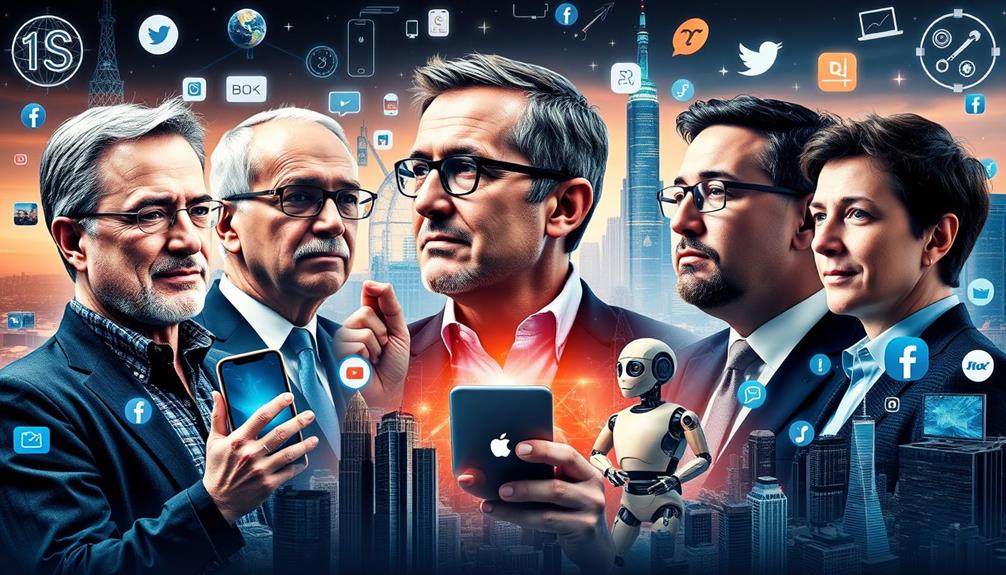In the 21st century, influential tech CEOs like Elon Musk, Tim Cook, and Satya Nadella have reshaped industries with their groundbreaking innovations. Musk's electric vehicles and space explorations revolutionized transportation, while Cook emphasized design and sustainability at Apple. Nadella's focus on AI and cloud computing propelled Microsoft's market value greatly. Other notable leaders like Lisa Su and Sundar Pichai have also made their mark, driving competition and ethical tech respectively. Each CEO's unique leadership style showcases how their visions have impacted the tech landscape. Stay tuned to discover more about their contributions and legacies in transforming technology.
Key Takeaways
- Elon Musk revolutionized transportation with electric vehicles and advanced space travel, significantly impacting the automotive and aerospace industries.
- Satya Nadella transformed Microsoft into a cloud-first company, boosting its market value and revenue through AI and cloud computing innovations.
- Tim Cook emphasized design and sustainability at Apple, generating substantial revenue growth through a focus on privacy and an expanding services division.
- Lisa Su revitalized AMD, enhancing competitiveness in the semiconductor industry and driving innovation in high-performance computing.
- Sundar Pichai positioned Google as an AI leader, substantially increasing revenue while promoting ethical technology and sustainable practices.
Overview of Influential Tech Leaders
In the rapidly evolving landscape of technology, influential leaders like Elon Musk, Tim Cook, and Satya Nadella are at the forefront of innovation, shaping industries and changing the way we live and work.
These CEOs have redefined their respective technology companies with groundbreaking ideas. Musk's push for electric vehicles is revolutionizing transportation, while Cook has transformed consumer technology through products that blend functionality with design.
Additionally, AI-driven solutions in various industries, including AI in Cybersecurity, demonstrate the transformative power of technology under their leadership.
Satya Nadella emphasizes the importance of artificial intelligence, steering Microsoft into new domains of cloud computing and global business.
Similarly, Lisa Su, as CEO of AMD, has revitalized the semiconductor industry, enhancing competition and driving significant revenue growth.
Bill Gates shifted from his role as a tech innovator to a philanthropist, impacting global health and education with the Bill & Melinda Gates Foundation.
Jack Dorsey, co-founder of Twitter and Square, has tackled misinformation on social media, advocating for transparency and accountability.
Each of these influential tech leaders showcases unique leadership roles that not only drive their companies forward but also influence the broader landscape of technology and society.
Their contributions continue to shape our world in profound ways.
Key Achievements of Tech CEOs

When you look at the key achievements of today's tech CEOs, you'll see transformative innovations that have reshaped industries.
Their leadership styles not only drive company success but also emphasize responsibility and philanthropy.
For instance, many tech leaders are leveraging unique business ideas to create sustainable growth, showcasing the importance of innovation in a competitive market unlocking business potential.
This combination of impact, innovation, and social commitment sets them apart in the 21st-century landscape.
Transformative Innovations and Technologies
As the landscape of technology continues to evolve, CEOs like Elon Musk, Satya Nadella, Tim Cook, Sundar Pichai, and Jensen Huang have spearheaded transformative innovations that have reshaped industries. These technology leaders not only tackle global challenges but also redefine what's possible through their entrepreneurial ventures.
Here's a snapshot of their key achievements:
| CEO | Transformative Innovation | Impact |
|---|---|---|
| Elon Musk | Electric vehicles and commercial space travel | Revolutionized automotive and space sectors |
| Satya Nadella | Cloud computing and AI technologies | Elevated Microsoft's market value to $3T |
| Tim Cook | Privacy and sustainability initiatives | Generated $365.8 billion in revenue |
| Sundar Pichai | Advancements in AI and ethical tech | Boosted Google's revenue to $257.6 billion |
| Jensen Huang | Leadership in graphics processing units (GPUs) | Drove Nvidia's revenue to $16.7 billion |
These CEOs have not only enhanced technology but also set a benchmark for future innovations, proving that visionary leadership can make a significant impact on our world.
Leadership Style and Impact
Leadership styles among tech CEOs play an essential role in shaping their companies' trajectories and driving innovation. For instance, the influence of AI Ethicist Jobs is increasingly recognized as companies prioritize ethical considerations in technology development.
Take Satya Nadella, for instance. His collaborative leadership style transformed Microsoft into a cloud-first company, boosting its market valuation to over $3 trillion.
Tim Cook built on Apple's legacy with operational excellence and sustainability, leading to impressive revenue growth of $365.8 billion in 2021.
Marc Benioff's visionary approach pioneered the software as a service (SaaS) model, propelling Salesforce to $17.1 billion in revenue while advocating for corporate responsibility through the 1-1-1 philanthropy model.
Lisa Su revitalized AMD with her focus on high-performance computing and strategic partnerships, positioning the company as a formidable competitor in the semiconductor market, resulting in a revenue of $22.7 billion in 2020.
Elon Musk's bold leadership style has disrupted the automotive and aerospace industries. His commitment to sustainable energy and space exploration achieved Tesla's market capitalization of over $1 trillion in 2021.
Each of these leaders exemplifies how impactful leadership styles can drive innovation and considerably influence their respective industries.
Philanthropic Initiatives and Responsibility
Philanthropy in the tech industry has seen a remarkable evolution, with CEOs stepping up to tackle some of the world's most pressing challenges. Leaders like Bill Gates and Marc Benioff have set a high bar through impactful initiatives. Their dedication to global health, education, and corporate responsibility is reshaping how tech companies engage with charitable causes.
Here's a snapshot of their contributions:
| CEO | Key Initiative | Impact |
|---|---|---|
| Bill Gates | Bill & Melinda Gates Foundation | Over $50 billion to global health and education |
| Marc Benioff | 1-1-1 Model | $600 million in donations and volunteer hours |
| Tim Cook | 100% recycled materials, carbon-neutral supply | Sustainability in product development |
| Jack Dorsey | $1 billion for COVID-19 relief | Enhanced transparency in philanthropy |
| Sundar Pichai | $1 billion for computer science education | Support for underserved communities |
These initiatives demonstrate a commitment to community initiatives and a vision for a better future. By investing in education and global health, these CEOs aren't just driving profits; they're driving change.
Impact on Industry Innovation

Tech CEOs have been at the forefront of driving technological advancements that reshape entire industries.
Their innovative strategies not only shape market trends but also transform traditional business models, often demonstrating the importance of adaptive SEO approaches in niche markets.
As you explore their contributions, you'll recognize their pivotal role in defining the future of technology.
Driving Technological Advancements
The 21st century has seen a remarkable shift in technological advancements, largely driven by visionary CEOs who aren't just responding to industry demands but actively shaping them.
Take Elon Musk, for instance. Through Tesla and SpaceX, he's revolutionized electric vehicles and space exploration, pushing sustainable energy and commercial space travel into the limelight. This commitment to sustainability mirrors the growing importance of energy-efficient solutions like heat pumps in addressing climate change.
Similarly, Satya Nadella transformed Microsoft into a cloud-first company, driving it to a market valuation exceeding $3 trillion while emphasizing AI advancements.
Meanwhile, Tim Cook has kept Apple's innovation trajectory strong, expanding product lines and services with a focus on sustainability and privacy, setting new industry standards.
Jensen Huang's leadership at Nvidia has made it a dominant force in GPUs and AI technology, with ambitions to become the first trillion-dollar semiconductor stock.
Finally, Lisa Su revitalized AMD, allowing it to effectively compete in the semiconductor market through significant advancements in high-performance computing.
These CEOs aren't just participants in their industries; they're the architects of change, shaping the future of technology and driving innovations that redefine how we live and work.
Shaping Market Trends
In recent years, strategic decisions made by influential CEOs have greatly shaped market trends across various industries. You can't overlook how these technology executives have pushed boundaries and redefined innovation.
For instance, the integration of AI in various sectors has enhanced operational efficiency and personalized solutions, reflecting the ongoing tech revolution. Consider the following:
- Elon Musk has accelerated the adoption of electric vehicles with Tesla and advanced private space travel through SpaceX, driving sustainable practices in automotive and aerospace industries.
- Satya Nadella transformed Microsoft into a cloud-first company, boosting revenue from $77 billion in 2014 to over $168 billion in 2021, considerably impacting the tech industry's shift toward cloud computing.
- Sundar Pichai positioned Google as a leader in AI technology, contributing to a remarkable revenue increase from $161.86 billion in 2020 to $257.64 billion in 2021, showcasing how AI enhances accuracy in medical diagnoses and treatment.
- Tim Cook expanded Apple's services division, leading to $68.4 billion in revenue in 2021, reflecting a broader industry trend toward service-oriented business models.
Additionally, Jack Dorsey influenced social media policies and payment systems at Twitter and Square, showcasing the intersection of technology and finance.
Collectively, these leaders are reshaping the landscape, ensuring that innovation remains at the forefront of market trends.
Transforming Business Models
As businesses adapt to an ever-evolving landscape, transforming business models has become essential for industry innovation.
Take Microsoft, for example. Under Satya Nadella's leadership, it shifted to a cloud-first approach, catapulting revenue from $93.58 billion in 2017 to $198.27 billion in 2021. This showcases how cloud computing can redefine traditional frameworks, much like how hydration tips are vital for high-altitude trekking.
Similarly, Tim Cook at Apple expanded the product ecosystem with subscription services, generating $68.4 billion in 2021. This strategy not only stabilized revenue but also reflected a shift in consumer spending habits.
Daniel Zhang's Alibaba revolutionized e-commerce with the Singles Day shopping event, amassing $74.1 billion in 2020 and proving large-scale promotions can drive massive sales.
Marc Benioff's Salesforce led the charge in the Software as a Service model, achieving $21.25 billion in 2021 and reshaping how businesses manage customer relationships through cloud-based solutions.
Meanwhile, Elon Musk's Tesla disrupted the automotive industry by prioritizing electric vehicles, resulting in a market cap exceeding $1 trillion in 2021.
These tech CEOs illustrate that transforming business models isn't just beneficial; it's vital for sustaining innovation across industries.
Leadership Styles and Strategies

Leadership styles and strategies among tech CEOs have evolved dramatically in the 21st century, reflecting their unique visions and the rapidly changing landscape of the industry. As you explore the approaches of these influential leaders, you'll notice key trends shaping their success:
- Transformational Leadership: Satya Nadella's cloud-first culture at Microsoft emphasizes empathy and collaboration, boosting the company's market value to over $3 trillion. This approach aligns with the idea that effective leadership can enhance psychological impact of zodiac signs on self-perception, further motivating teams to excel.
- Customer-Centric Focus: Antonio Neri at HPE champions the "Everything as a Service" model, prioritizing customer needs and leveraging strategic acquisitions for better market positioning. This focus mirrors the simplicity and minimalism seen in successful design trends, promoting creativity and innovation.
- Innovative Disruption: Elon Musk leads Tesla and SpaceX with a visionary drive, pushing advancements in electric vehicles and space exploration to tackle global challenges.
- Agility and Scalability: Insights from Neil Gunther encourage tech giants to adopt agile methodologies, allowing organizations to swiftly adapt to market demands and optimize performance.
Moreover, philanthropic integration, as seen in Bill Gates' work through the Gates Foundation, emphasizes how tech leaders can incorporate social responsibility into their strategies.
These elements showcase how effective leadership in the tech industry can create significant value and drive transformative change.
Major Challenges Facing Tech CEOs

Steering through the complexities of the tech landscape, CEOs face a myriad of challenges that test their resilience and adaptability. One of the biggest issues is data privacy and security. With high-profile breaches constantly making headlines, you need to address consumer concerns while complying with stringent regulations.
The rapid pace of technological change demands continuous innovation, pushing you to pivot your organization toward cloud and AI solutions to remain competitive. Additionally, maintaining a healthy organizational culture is vital for long-term success, as a motivated workforce can drive innovative solutions and enhance productivity, contributing to heart health protection.
Moreover, balancing profitability with social responsibility is no small feat. Leaders like you must maneuver public backlash against misinformation and harmful content, particularly on social media platforms. Global supply chain disruptions further complicate matters, as you adapt sourcing strategies and manage production delays, which impact product availability and pricing.
Additionally, regulatory pressures are mounting. Antitrust investigations can reshape competition dynamics, forcing you to rethink business practices and strategies in a landscape that's already fiercely competitive.
In this climate, effective leadership requires not just strategic foresight but also a commitment to ethical practices that resonate with consumers and stakeholders alike. Maneuvering these challenges will define your success in the ever-evolving tech world.
Emerging Leaders in Technology

Steering through the challenges of the tech landscape has paved the way for a new generation of leaders who are redefining innovation and accessibility.
These emerging CEOs are making considerable strides in global tech, showcasing their innovative endeavors. Their ability to maneuver complexities and embrace curiosity as a success tool has empowered them to drive forward-thinking strategies.
- Melanie Perkins has revolutionized graphic design accessibility with Canva, achieving a valuation of over $6 billion by democratizing design tools.
- Daniel Ek transformed the music industry as CEO of Spotify, boasting over 320 million active users and generating $7.3 billion in revenue in 2019 through popular streaming services.
- Kelly Bayer Rosmarin leads Optus, focusing on innovation and digital transformation in telecommunications, leveraging her extensive banking experience since 2020.
- Ronaldo Mouchawar founded Souq, which became a leading online marketplace, later acquired by Amazon for $580 million, considerably impacting e-commerce in the Middle East.
Additionally, Ben Silbermann, co-founder of Pinterest, has redefined visual discovery, allowing users to interact through image-based inspiration on a global scale.
Together, these leaders aren't just maneuvering the tech landscape; they're reshaping it for the future.
Global Influence of Tech Leadership

Tech CEOs are at the forefront of shaping industry standards and driving global innovation.
Their strategic decisions influence not just their companies but also the broader tech landscape, affecting everything from consumer behavior to sustainability practices.
As you explore their impact, consider how these leaders are setting the stage for the future of technology worldwide.
Shaping Industry Standards
In the 21st century, influential tech leaders have fundamentally reshaped industry standards across various sectors. Their leadership styles have prioritized collaboration and ethical practices, driving innovation to new heights. You can see this impact through several key figures and their initiatives:
- Satya Nadella (Microsoft): Shifted corporate culture towards collaboration and customer value, influencing cloud computing and AI integration standards.
- Elon Musk (Tesla, SpaceX): Established benchmarks for sustainable energy solutions and commercial space travel, prompting competitors to innovate.
- Tim Cook (Apple): Emphasized privacy and ethical sourcing, setting industry standards for data protection and responsible supply chain practices.
- Sundar Pichai (Google): Advocated for ethical AI development and inclusivity, shaping expectations for responsible technology deployment.
Additionally, Jack Dorsey's focus on transparency in social media has spurred industry-wide initiatives to combat misinformation.
This collective push by tech CEOs demonstrates how their influential leadership not only drives technology forward but also sets ethical guidelines that reshape industry standards.
Driving Global Innovation
Few sectors have experienced the transformative power of innovation like technology, thanks to influential leaders who drive change on a global scale.
Tech CEOs like Satya Nadella have reshaped Microsoft into a cloud-first powerhouse, boosting its market value to over US$3 trillion. This shift highlights the role of innovative technologies in fostering global advancements.
Elon Musk's leadership at Tesla and SpaceX hasn't only revolutionized electric vehicles but also sparked worldwide discussions on sustainable energy and commercial space travel.
Meanwhile, Sundar Pichai has steered Alphabet Inc. toward breakthroughs in AI and ethical tech, considerably impacting global search and advertising markets, which generated revenues of US$307.4 billion in 2021.
Tim Cook continues Apple's legacy of innovation, emphasizing privacy and sustainable practices while expanding its software offerings. Under his guidance, Apple achieved a remarkable revenue of US$365.8 billion in 2021.
Finally, Jack Ma's Alibaba has transformed e-commerce in China and beyond, inspiring countless entrepreneurs and demonstrating the potential of online marketplaces with a revenue of US$72 billion in 2020.
Together, these CEOs exemplify how tech leadership drives global innovation.
Contributions to Sustainability

Sustainability has become an essential focus for many of today's leading CEOs, who are leveraging their influence to drive positive environmental change.
You'll find that their contributions are reshaping industries and setting ambitious goals for the future. Here are some remarkable efforts:
- Elon Musk: At Tesla, he's accelerated the shift to sustainable energy with electric vehicles, greatly reducing carbon emissions in the automotive sector.
- Tim Cook: Apple aims to become carbon neutral across its entire supply chain and product life cycle by 2030, incorporating recycled materials in their products.
- Sundar Pichai: Google is committed to achieving carbon-free energy across all data centers and campuses by 2030, focusing on renewable energy sources and energy efficiency.
- Antonio Neri: HPE promotes the "Everything as a Service" model, encouraging sustainable consumption by optimizing resources within IT infrastructure.
These CEOs aren't only advocating for climate change solutions but also investing in clean energy technologies.
Their efforts reflect a growing commitment to sustainability that's essential for the planet's future.
Future Trends in Tech Leadership

As tech leaders embrace sustainability, they're also gearing up for future trends that will redefine their roles and responsibilities. One key trend is the rise of ethical AI development, with CEOs like Sundar Pichai of Alphabet prioritizing responsible tech practices and fostering diversity and inclusion within their teams. This focus guarantees that technological advancements benefit everyone, not just a select few.
Additionally, the shift towards remote work has propelled leaders like Satya Nadella at Microsoft to implement cloud-first strategies that enhance productivity and connectivity across the globe. These strategies are essential as companies adapt to the changing workplace landscape.
Moreover, emerging technologies like blockchain and quantum computing demand that future tech CEOs possess adaptable skills and visionary strategies. Innovators like Elon Musk exemplify this, as they explore sustainable energy and space exploration, pushing boundaries in tech leadership.
Ultimately, the most successful tech CEOs will prioritize sustainability, ethical practices, and inclusivity while embracing emerging technologies. By doing so, they'll not only shape their companies but also positively impact society as a whole, setting the stage for a more equitable future.
Legacy of Tech CEOs

The impact of tech CEOs on the industry is profound and far-reaching, shaping the way we interact with technology today. Their legacies are defined by innovation, leadership, and the ability to address global challenges. Here are four key aspects of their enduring influence:
- Transforming Access: Visionaries like Steve Jobs and Bill Gates revolutionized personal computing, making technology accessible to the masses.
- Driving Sustainability: Elon Musk's ventures with Tesla and SpaceX not only push boundaries in energy and space but also set a standard for addressing global challenges.
- Shaping Economic Value: Satya Nadella's leadership at Microsoft shifted focus to cloud computing and AI, markedly boosting the company's market value and positioning it at the forefront of the tech industry.
- Inspiring Entrepreneurs: Jack Ma's Alibaba redefined e-commerce and motivated a new wave of entrepreneurs, reshaping online retail dynamics globally.
These tech CEOs haven't only driven innovation but also established ethical practices, as seen with Tim Cook's emphasis on privacy and sustainability.
Their legacies continue to influence the next generation of leaders and entrepreneurs in the tech industry.
Conclusion
As you reflect on the dynamic landscape shaped by these tech CEOs, envision the bright glow of innovation juxtaposed with the shadows of their challenges. They've transformed industries, sparking revolutions while steering turbulent waters. With each breakthrough, they've forged paths for future leaders, blending ambition with responsibility. Their legacies inspire a delicate balance between progress and sustainability, urging you to contemplate how today's decisions will illuminate tomorrow's tech landscape. The future beckons, shaped by their daring visions.









